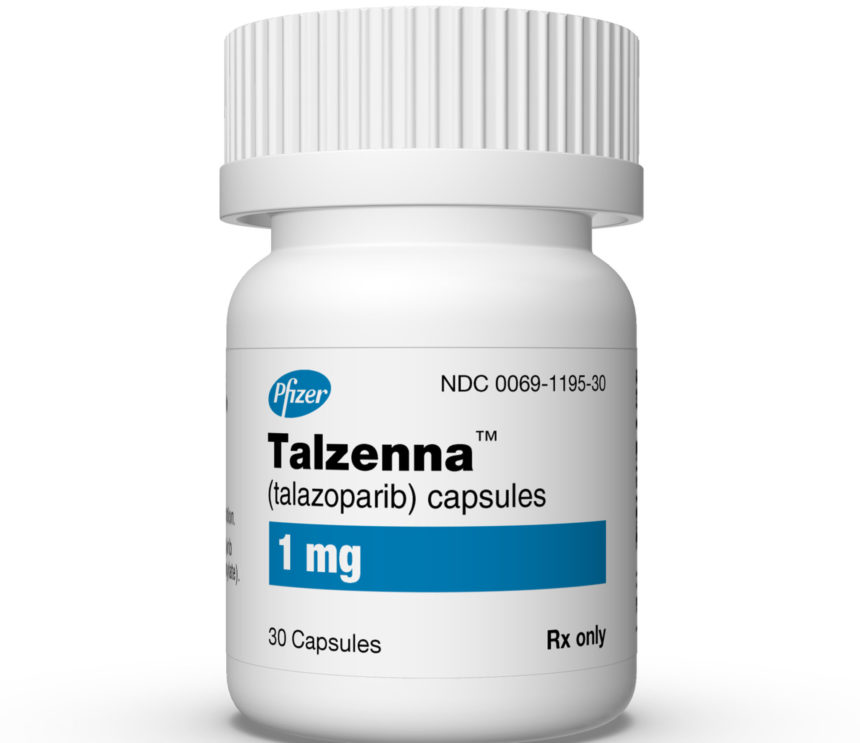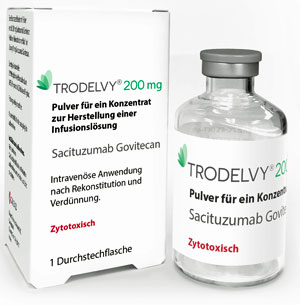Talzenna (talazoparib) vs Trodelvy (sacituzumab govitecan-hziy)
Talzenna (talazoparib) vs Trodelvy (sacituzumab govitecan-hziy)
Talzenna (talazoparib) is a PARP inhibitor used primarily to treat certain types of breast cancer with a specific genetic mutation (BRCA), while Trodelvy (sacituzumab govitecan-hziy) is an antibody-drug conjugate indicated for the treatment of metastatic triple-negative breast cancer after at least two prior therapies. Talzenna works by exploiting the DNA repair weaknesses in cancer cells with BRCA mutations, potentially preventing the cancer cells from repairing and causing them to die, whereas Trodelvy delivers a cytotoxic agent directly to the cancer cells, minimizing effects on normal cells. The choice between Talzenna and Trodelvy would depend on the specific cancer subtype, genetic markers, prior treatments, and the patient's overall health profile, which should be discussed with an oncologist to determine the most appropriate treatment option.
Difference between Talzenna and Trodelvy
| Metric | Talzenna (talazoparib) | Trodelvy (sacituzumab govitecan-hziy) |
|---|---|---|
| Generic name | talazoparib | sacituzumab govitecan-hziy |
| Indications | Germline BRCA-mutated HER2-negative locally advanced or metastatic breast cancer | Metastatic triple-negative breast cancer (mTNBC), metastatic urothelial cancer, and hormone receptor-positive, HER2-negative metastatic breast cancer |
| Mechanism of action | Poly (ADP-ribose) polymerase (PARP) inhibitor | Antibody-drug conjugate targeting Trop-2 |
| Brand names | Talzenna | Trodelvy |
| Administrative route | Oral | Intravenous |
| Side effects | Anemia, neutropenia, thrombocytopenia, fatigue, nausea, headache | Neutropenia, diarrhea, nausea, anemia, fatigue, vomiting, alopecia, constipation, decreased appetite, rash |
| Contraindications | Hypersensitivity to talazoparib | Hypersensitivity to sacituzumab govitecan-hziy or its excipients |
| Drug class | Poly (ADP-ribose) polymerase inhibitor | Antibody-drug conjugate |
| Manufacturer | Pfizer | Gilead Sciences, Inc. |
Efficacy
Efficacy of Talzenna (talazoparib) in Breast Cancer
Talzenna (talazoparib) is a poly (ADP-ribose) polymerase (PARP) inhibitor approved by the U.S. Food and Drug Administration (FDA) for the treatment of patients with deleterious or suspected deleterious germline BRCA-mutated, HER2-negative locally advanced or metastatic breast cancer. Patients selected for therapy must be identified to have a BRCA mutation using an FDA-approved test. The efficacy of Talzenna was demonstrated in the EMBRACA trial, a phase 3 study that showed a significant improvement in progression-free survival (PFS) for patients treated with talazoparib compared to standard chemotherapy. Patients receiving Talzenna experienced a median PFS of 8.6 months versus 5.6 months in those receiving chemotherapy, indicating a 46% reduction in the risk of disease progression or death.
Efficacy of Trodelvy (sacituzumab govitecan-hziy) in Breast Cancer
Trodelvy (sacituzumab govitecan-hziy) is an antibody-drug conjugate indicated for the treatment of adult patients with unresectable locally advanced or metastatic triple-negative breast cancer (TNBC) who have received two or more prior systemic therapies, at least one of them for metastatic disease. The approval of Trodelvy was based on the results of a phase 3 study (ASCENT) that demonstrated a significant improvement in overall survival (OS) and PFS. Patients treated with Trodelvy had a median OS of 12.1 months compared to 6.7 months for patients on standard chemotherapy. Additionally, the median PFS was 5.6 months for patients receiving Trodelvy, compared to 1.7 months for those on chemotherapy.
Both Talzenna and Trodelvy represent important advancements in the treatment of specific subtypes of breast cancer. Talzenna's efficacy in BRCA-mutated breast cancer and Trodelvy's efficacy in triple-negative breast cancer address previously unmet needs in these patient populations. Their approvals underscore the importance of personalized medicine and the use of biomarkers to guide therapy selection for breast cancer patients.
It is important for healthcare providers to consider the individual patient's disease characteristics and prior treatments when deciding to use these medications. As with all cancer therapies, the benefits must be weighed against the potential risks, and treatment should be guided by ongoing clinical assessment and patient preferences. Both Talzenna and Trodelvy have specific side effect profiles that need to be managed according to their respective prescribing information.
Regulatory Agency Approvals
Talzenna
-
European Medical Agency (EMA), European Union

-
Food and Drug Administration (FDA), USA

-
Therapeutic Goods Administration (TGA), Australia

Trodelvy
-
European Medical Agency (EMA), European Union

-
Food and Drug Administration (FDA), USA

Access Talzenna or Trodelvy today
If Talzenna or Trodelvy are not approved or available in your country (e.g. due to supply issues), you can access them via Everyone.org.
How it works

Make an enquiry
Choose the medicine you want to buy, answer a couple of questions, and upload your prescription to speed things up. We’ll get back to you within 24 hours.


Make an enquiry
Choose the medicine you want to buy, answer a couple of questions, and upload your prescription to speed things up. We’ll get back to you within 24 hours.


Breeze through the paperwork
We'll guide you through the required documents for importing unapproved medicine, ensuring you have all the necessary information.


Get a personalized quote
We’ll prepare a quote for you, including medicine costs and any shipping, administrative, or import fees that may apply.


Receive your medicine
Accept the quote and we’ll handle the rest - sourcing and safely delivering your medicine.

Some text on this page has been automatically generated. Speak to your physician before you start a new treatment or medication.
Let's talk
If you have any questions, call us or send us a message through WhatsApp or email:
Contact us




